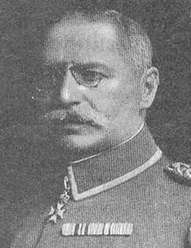 W
WPrince Alfons of Bavaria was a member of the Bavarian Royal House of Wittelsbach and a General of Cavalry.
 W
WAdolf Freiherr von Asch zu Asch auf Oberndorff was a Bavarian military officer.
 W
WJohann Kaspar (Jean-Gaspard) Reichsgraf Basselet von La Rosée was a leading Bavarian general.
 W
WFelix Ludwig Graf von Bothmer was a German general from Bavaria, notably during the Brusilov offensive of 1916.
 W
WJakob Ritter von Danner was a Bavarian general in the Imperial German Army and the Reichswehr. As commandant of the Munich garrison of the Reichswehr, he was a central figure in putting down the attempted Beer Hall Putsch by Adolf Hitler and the Nazis in 1923.
 W
WBernhard Erasmus von Deroy from the Electorate of the Palatinate became a noted general officer in the army of Bavaria. His military career began shortly after the start of the Seven Years' War. During the French Revolutionary Wars he first served on the side of the Coalition against the French revolutionaries, then fought as an ally of the First French Empire during the Napoleonic Wars. Deroy and his colleague, Karl Philipp von Wrede, were dominant personalities in the Bavarian military during the era of Napoleon Bonaparte.
 W
WFranz Ritter von Epp, born Franz Epp, from 1918 Ritter von Epp, was a German general and politician who started his military career in the Bavarian Army. Successful wartime military service earned him a knighthood in 1916. After the end of World War I and the dissolution of the German Empire, von Epp was a commanding officer in the Freikorps and the Reichswehr. He was a member of Bavarian People's Party, before joining the Nazi Party in 1928, when he was elected as a member of the German parliament or Reichstag, a position he held until the fall of Nazi Germany. He was the Reichskommissar, later Reichsstatthalter, for Bavaria, and a Reichsleiter of the Nazi Party.
 W
WKarl Ritter von Fasbender was a Bavarian General der Infanterie who served as a corps commander throughout World War I and briefly commanded an army at the end of the war.
 W
WPrince Franz of Bavaria was a member of the Bavarian Royal House of Wittelsbach and a Major General in the Bavarian Army.
 W
WAnton Joseph Freiherr von Gumppenberg was a Bavarian military and War Minister from June 9, 1839, to March 1, 1847. His last military rank was General der Infanterie.
 W
WJakob Freiherr von Hartmann was a Bavarian general who served in the Austro-Prussian War and Franco-Prussian War.
 W
WKarl Ernst Haushofer was a German general, professor, geographer, and politician. Through his student Rudolf Hess, Haushofer's ideas known as Geopolitik influenced the development of Adolf Hitler's expansionist strategies, although Haushofer denied direct influence on Nazi Germany. Under the Nuremberg Laws, Haushofer's wife and children were categorized as Mischlinge. His son, Albrecht, was issued a German Blood Certificate through the help of Hess.
 W
WCarl Wilhelm von Heideck was a Bavarian military officer, a philhellene and painter.
 W
WAdolf Ritter von Heinleth was a Bavarian General der Infanterie and War Minister under Ludwig II of Bavaria and under Otto of Bavaria.
 W
WPhilipp von Hellingrath was a Bavarian General der Kavallerie and the last War Minister under Ludwig III of Bavaria.
 W
WFranz Xaver Joseph Ignaz Freiherr von Hertling was a Bavarian lieutenant general and War Minister from December 12, 1836 until November 11, 1838.
 W
WBernhard Franz von Hess was a Bavarian Lieutenant General and War Minister under Maximilian II of Bavaria.
 W
WLeonhard Freiherr von Hohenhausen und Hochhaus was a Bavarian military and Acting War Minister from 1 March 1847 to 1 February 1848. His last military rank was General der Kavallerie.
 W
WMaximilian Ritter von Höhn was a general Royal Bavarian Army during World War I.
 W
WCount Karl August von Beckers zu Westerstetten was a Bavarian infantry general.
 W
WPrince Karl of Bavaria was a member of the Bavarian Royal House of Wittelsbach and a Major General in the Bavarian Army.
 W
WKonrad Krafft von Dellmensingen was a Bavarian Army general in World War I. He served as Chief of the General Staff of the Royal Bavarian Army before World War I and commanded the elite Alpenkorps, the Imperial German Army's mountain division formed in 1915.
 W
WKarl August Krazeisen was a Bavarian soldier, philhellene and portraitist.
 W
WPaul Otto Felix Freiherr Kreß von Kressenstein was a Bavarian Colonel General and War Minister from 16 February 1912 to 7 December 1916.
 W
WOtto Hermann von Lossow was a Bavarian Army and then German Army officer who played a prominent role in the events surrounding the attempted Beer Hall Putsch by Adolf Hitler and the Nazi Party in November 1923.
 W
WJoseph Maximilian Fridolin Ritter von Maillinger was a Bavarian General der Infanterie and War Minister under Ludwig II of Bavaria.
 W
WFerdinand Malaisé, after 1862 Ritter Ferdinand von Malaisé. Knight of the Order of St. Joseph of Tuscany, the Iron Crown of Austria and the Bavarian Order of Merit, Major General, 1st Royal Bavarian Field Artillery Brigade, Professor of Mathematics, Royal Bavarian Cadet Corps and tutor to Ludwig III, the last King of Bavaria.
 W
WFranz Freiherr von Mercy, Lord of Mandre and Collenburg, was a German general in the Thirty Years' War who fought for the Habsburg side.
 W
WCount Maximilian Maria Karl Desiderius de Garnerin de la Thuile von Montgelas was a Bavarian general and diplomat.
 W
WSiegmund Freiherr von Pranckh, descendant of the ancient Austrian noble family Pranckh, originally residentiary in the former March and later Duchy of Styria, was a Bavarian general and Minister of War. Pranckh joined the army in Munich in 1840 from the cadet corps and in 1849 worked on the staff of the Generalquartiermeister. He remained in the War Department until 1863 before entering the 3rd Infantry Regiment as an oberst and then in 1865 entered the Lifeguards Regiment, with which he fought in the Austro-Prussian War, participating in the battle of Kissingen and the storming of Nüdlingen. Shortly afterwards, Pranckh and in 1868 reorganised the Bavarian Army.
 W
WClemens or Klemens Wenzel Freiherr von Raglovich und zum Rosenhof was a Bavarian General der Infanterie.
 W
WRupprecht, Crown Prince of Bavaria, Duke of Bavaria, Franconia and in Swabia, Count Palatine by (the) Rhine was the last heir apparent to the Bavarian throne. During the first half of the First World War he commanded the 6th Army on the Western Front. From August 1916, he commanded Army Group Rupprecht of Bavaria, which occupied the sector of the front opposite the British Expeditionary Force.
 W
WBenignus Ritter von Safferling was a Bavarian General der Infanterie and War Minister under Otto of Bavaria.
 W
WJohann Philipp Kratz von Scharffenstein was a German nobleman and field marshal, who fought during the course of the Thirty Years' War. He served with distinction in forces of both the Catholic League and Holy Roman Empire. His poor relationship with the Imperial generalissimo Albrecht von Wallenstein frustrated his plan of becoming the supreme commander of the League's forces. Embittered by this he defected to Sweden, where he attained the rank of field marshal. He was captured at the Battle of Nördlingen (1634) and executed for treason a year later.
 W
WKarl Spruner von Merz, or Karl von Spruner as he preferred to be known, was a German cartographer and scholar.
 W
WOtto von Stetten was a German General of the Cavalry in World War I.
 W
WLudwig Samson Heinrich Arthur Freiherr von und zu der Tann-Rathsamhausen was a Bavarian general.
 W
WJohann Nepomuk Joseph Florian, Graf von Triva was a Bavarian General der Artillerie. He was the first War Minister of the Bavarian kingdom.
 W
WBaron Jacobus von Washington was a lieutenant general in the Bavarian Army and a distant relative of US President George Washington. Born in The Hague, Netherlands, he was christened James Washington. Most of his adult life was shaped by his participation in wars for and against Napoleonic France and his service to Ludwig I of Bavaria.
 W
WCarl also Karl Romanus von Weishaupt was a Bavarian lieutenant general and War Minister under Maximilian II of Bavaria from 5 April to 21 November 1848.
 W
WKarl Philipp Josef, Prince von Wrede was a Bavarian field marshal. He was an ally of Napoleonic France until he negotiated the Treaty of Ried with Austria in 1813. Thereafter Bavaria joined the coalition.
 W
WOskar Ritter und Edler von Xylander was a Bavarian General der Infanterie, at last commanding the I Royal Bavarian Corps until his retirement in 1918.